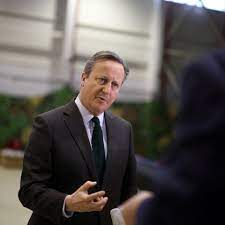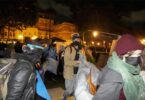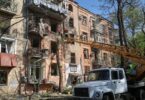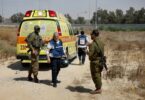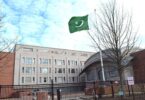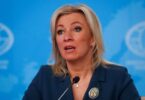LONDON (AFP): The British government said late Friday it had summoned diplomats from the Russian embassy “to make clear that we hold the Russian authorities fully responsible” for the death of Kremlin critic Alexei Navalny.
Russian officials said Navalny, 47, had died on Friday in an Arctic prison, a month before an election poised to extend President Vladimir Putin’s hold on power.
“In recent years, the authorities imprisoned him on fabricated charges, poisoned him with a banned nerve agent, and sent him to an Arctic penal colony.
“No one should doubt the brutal nature of the Russian system,” a Foreign Office spokesperson said.
The Foreign Office “summoned the Russian embassy to make clear that we hold the Russian authorities fully responsible”.
“Alexei Navalny dedicated his life to exposing the corruption of the Russian system, calling for free and open politics, and holding the Kremlin to account,” the spokesperson said.
Earlier Friday, British Foreign Secretary David Cameron said Putin “should be accountable for what has happened” and paid tribute to Navalny’s courage.
Supporters of Navalny turned out across Europe and in the United States on Friday evening to pay tribute to the man widely acknowledged as Russia’s main opposition figure, even when he was behind bars.
In London, dozens of people gathered in front of the Russian embassy carrying signs in English and Russian saying: “Stop Putin”, “Assassins” and “We are Navalny”.
Mourners in Europe, US pay tribute to Navalny
Supporters of Alexei Navalny turned out across Europe and in the United States on Friday to pay tribute to the man widely acknowledged as Russia’s main opposition figure, even when he was behind bars.
Navalny’s death was announced earlier in the day by officials in the Arctic prison where he was serving a 19-year sentence.
From New York and Washington to cities in western Europe to capitals of former Soviet bloc states, mourners showed their respect for Navalny, a charismatic lawyer who rallied domestic opposition to Russian President Vladimir Putin.
Many were quick to blame Navalny’s death on Putin.
“Putin murderer! Putin to the Hague,” cried a crowd massed before Russia’s imposing embassy in Berlin — a reference to the Dutch city that hosts the International Criminal Court.
Most of the several hundred people gathered there were Russian speakers, many holding up posters of members of the opposition or slogans criticising Putin.
“It’s a hard hit emotionally,” said Evgueni Syrokin, who coordinates the “FreeNavalny” movement in Germany.
“It pushes us to continue to work, to struggle against Putin,” added the 43-year-old, bearing a black and white photo of the opposition figure.
Behind him, flowers, candles and photos of Navalny were laid on the pavement.
– Candles and flowers –
In Warsaw, about 100 people demonstrated outside the Russian embassy. Most were young and visibly upset.
One 29-year-old Russian who only wanted to be identified as Denislan said he saw Navalny as a symbol of Russian civil society.
“I am here because Russia should and can become a democratic country,” he said.
Candles and flowers were spread out in front of the gates of the well-guarded embassy.
In Switzerland, around 300 people attended an impromptu gathering outside Zurich’s train station, while more than 100 gathered in front of the United Nations in Geneva, carrying portraits of Navalny and white flowers.
And in Moscow too, small groups of Russians laid flowers at makeshift memorials.
Images on social media showed dozens queueing to place flowers at monuments to victims of political repression in the cities of Moscow and Saint Petersburg.
The shock announcement of Navalny’s death came a day before official campaigning starts in what critics say will be a stage-managed presidential election in March that will extend 71-year-old Putin’s two-decade hold on power.
In the Lithuanian capital of Vilnius, crowds gathered at a memorial to victims of the Soviet occupation.
“Even in prison he managed to find the force and give it to those who resist,” said one Russian resident of Vilnius who did not want to give his name.
In London, a few dozen gathered outside the Russian embassy with signs in English and Russian saying “Putin assassin”, “Navalny is our hero”, and “Putin go to hell”.
Hundreds also gathered in the capitals of Armenia, France, Georgia, and the Netherlands.
Across the ocean in New York, people laid flowers outside Russia’s consulate and hung photos of Navalny on the gates. Several people held signs saying “Putin-Killer.”
Several hundred people, some bearing posters and candles, also gathered in front of the Russian embassy in the US capital Washington, chanting “We are Navalny” and “Shame on Putin”.
The words “Putin murderer” were projected on to the embassy building.
“I expected it, but it’s still so painful that he left us so early,” Maryam Henry, a 44-year-old teacher, told AFP outside the embassy.
“It’s such a tragic day. He was a symbol of freedom, bravery and resistance,” said a 29-year-old gymnastics coach who gave her name as Polina.
Navalny barely survived a poisoning with the Soviet-designed nerve agent Novichok in 2020. Following treatment in Germany, he returned to Russia in 2021 and was immediately arrested and subsequently jailed.

